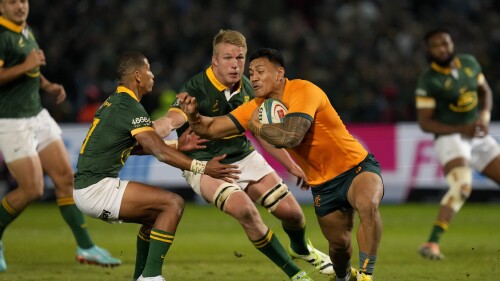New Zealand’s anti-nuclear stance means it won’t play a role in Australia’s submarine plans
WELLINGTON, New Zealand (AP) — New Zealand’s longstanding commitment to remaining nuclear-free means it won’t play a role in Australia’s plans to acquire nuclear-powered submarines, the leaders from both countries said after meeting Wednesday.
Australian Prime Minister Anthony Albanese made his first official visit to New Zealand since becoming leader last year and emphasized the growing closeness between the neighboring countries, including plans to make travel easier at the border.
But that closeness and alignment on many geopolitical issues won’t extend to the so-called AUKUS deal for the submarines that was brokered by Australia, the United States and Britain.
Other news Springboks try new Williams-Libbok halfback pairing in 9 changes for Argentina
South Africa will start a new halfback pairing of Grant Williams and Manie Libbok against Argentina on Saturday in a final home game before its Rugby World Cup title defense.
Springboks try new Williams-Libbok halfback pairing in 9 changes for Argentina
South Africa will start a new halfback pairing of Grant Williams and Manie Libbok against Argentina on Saturday in a final home game before its Rugby World Cup title defense.
 US-born Sarina Bolden now a Women’s World Cup star for the Philippines with winning goal
Sarina Bolden rose above two defenders and headed the ball toward the goal. New Zealand goalkeeper Victoria Esson bobbled and fumbled it as it crossed the line.
US-born Sarina Bolden now a Women’s World Cup star for the Philippines with winning goal
Sarina Bolden rose above two defenders and headed the ball toward the goal. New Zealand goalkeeper Victoria Esson bobbled and fumbled it as it crossed the line.
 Switzerland and Norway draw 0-0 at Women’s World Cup, leaving Group A up for grabs
Goalkeeper Gaelle Thalmann shielded Switzerland to a 0-0 draw against Norway at the Women’s World Cup.
Switzerland and Norway draw 0-0 at Women’s World Cup, leaving Group A up for grabs
Goalkeeper Gaelle Thalmann shielded Switzerland to a 0-0 draw against Norway at the Women’s World Cup.
 Philippines shocks co-host New Zealand 1-0 for its first win at the Women’s World Cup
Philippines made history at its first Women’s World Cup with its first goal and first win, holding on under pressure to upset co-host New Zealand.
Philippines shocks co-host New Zealand 1-0 for its first win at the Women’s World Cup
Philippines made history at its first Women’s World Cup with its first goal and first win, holding on under pressure to upset co-host New Zealand.
Some observers worry that New Zealand’s defense efforts risk becoming marginalized by the nation being left out of the deal.
“I think there is no question that we have a different position around nuclear, in terms of nuclear propulsion is also covered by New Zealand’s nuclear-free arrangements,” Hipkins said.
Albanese said there are “no plans at this point in time” to include New Zealand in a second stage of the AUKUS arrangement, which revolves around the use of advanced technology.
“We already have an important relationship in defense,” Albanese said of the two countries, adding that they are looking to extend cooperation across other areas, such as interoperability.
New Zealand’s opposition to having nuclear-armed or even nuclear-powered ships dock in its ports dates to the 1980s and stems from its opposition to nuclear testing in the Pacific. It has long been a sticking point in the nation’s defense relationship with the U.S. and, more recently, Australia.
New Zealand remains a member of the so-called Five Eyes intelligence-sharing alliance with the U.S., Britain, Canada and Australia.
In a joint statement, the leaders also said they were concerned a new police cooperation plan between China and the Solomon Islands “would undermine the Pacific’s agreed regional security norms.”
Disclaimer: The copyright of this article belongs to the original author. Reposting this article is solely for the purpose of information dissemination and does not constitute any investment advice. If there is any infringement, please contact us immediately. We will make corrections or deletions as necessary. Thank you.







